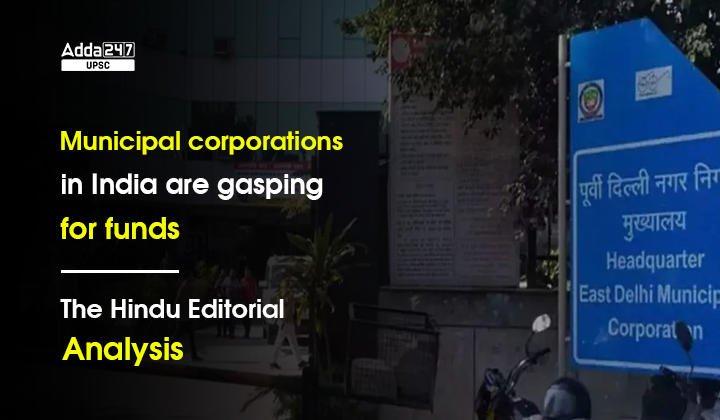Table of Contents
भारत में नगर निगम: यूपीएससी के लिए प्रासंगिकता
भारत में नगर निगम शहरी क्षेत्रों में सरकार के स्थानीय रूप हैं। नगर निगमों की स्थापना 74वें संविधान संशोधन अधिनियम के तहत की गई थी। यूपीएससी प्रारंभिक परीक्षा 2023 एवं यूपीएससी मुख्य परीक्षा (जीएस पेपर 2- भारत में स्थानीय सरकार) के लिए नगर निगम भी महत्वपूर्ण हैं।
भारत में नगर निगम चर्चा में क्यों हैं?
- भारत में सभी नगर निगमों का संयुक्त बजट केंद्र एवं राज्य सरकारों की तुलना में बहुत कम है, शहरी स्थानीय निकायों के वित्त से संबंधित भारतीय रिजर्व बैंक का एक विश्लेषण निष्कर्ष प्रस्तुत करता है।
भारत में नगर निगमों की वित्तीय स्थिति
- भारत में, संपत्ति कर, जल कर, पथ कर (टोल टैक्स) एवं अन्य स्थानीय करों सहित नगर निगमों का स्वयं का कर राजस्व वित्त वर्ष 18- वित्त वर्ष 20 की अवधि में कुल राजस्व का 31-34% था।
- यह हिस्सा कई अन्य देशों की तुलना में कम था एवं समय के साथ इसमें गिरावट भी आई।
- भारत भर के 201 नगर निगमों के बजटीय डेटा का उपयोग करते हुए, आरबीआई की रिपोर्ट ने उनकी कुल राजस्व प्राप्तियों की गणना की – जिसमें स्वयं का कर राजस्व, स्वयं का गैर-कर राजस्व तथा हस्तांतरण शामिल है।
- 2017-18 (वास्तविक) में, यह जीडीपी का 0.61% होने का अनुमान लगाया गया था एवं 2019-20 के बजट अनुमान के अनुसार, यह थोड़ा बढ़कर जीडीपी का 0.72% हो गया।
- यह ब्राजील के 7% एवं दक्षिण अफ्रीका के 6% से बहुत कम था।
- यदि नगर निगमों के अपने कर राजस्व को राज्यवार घटाया जाए तो बड़े अंतर देखे जा सकते हैं।
- 2017-18 में राज्य के सकल घरेलू उत्पाद के एक भाग के रूप में नगर निगमों का अपना कर राजस्व दिल्ली, गुजरात, चंडीगढ़, महाराष्ट्र एवं छत्तीसगढ़ में 1% के स्तर को पार कर गया, जबकि कर्नाटक, गोवा, असम तथा सिक्किम में यह 0.1% या उससे कम था।
- इस तरह के प्रभुत्व के बावजूद, भारत में संपत्ति कर संग्रह ओईसीडी देशों की तुलना में अधोमूल्यन (कम मूल्यांकन) एवं खराब प्रशासन के कारण अत्यंत कम था, रिपोर्ट का तर्क है।
- 70% से अधिक राजस्व व्यय जैसे वेतन/मजदूरी/बोनस (25%), परिचालन एवं रखरखाव शुल्क (16.2%), पेंशन (7.4%), इत्यादि पर व्यय किया गया, जबकि पूंजीगत व्यय 30% से कम था।
भारत में नगर निगमों के समक्ष चुनौतियाँ
- “नगर निगम के वित्त पर रिपोर्ट” शीर्षक वाले अध्ययन से ज्ञात होता है कि किस प्रकार नगरपालिका निकाय उत्तरोत्तर राज्य एवं केंद्र से धन हस्तांतरण पर निर्भर हैं, जबकि उनकी राजस्व अर्जन क्षमता सीमित है।
- अध्ययन से ज्ञात होता है कि उनकी राजस्व अभिनियोजित करने की शक्ति कम हो गई है। सीमित धन एक तरफ, इसका लगभग 70% वेतन, पेंशन एवं प्रशासनिक खर्चों पर व्यय किया जाता है तथा शेष पूंजीगत व्यय के लिए छोड़ दिया जाता है।
- और सबसे बढ़कर, नगर निगम अधिक ऋण नहीं लेते हैं, जिससे वे धन के लिए हांफते रहते हैं।
- भारत में नगर निगमों द्वारा अर्जित कर उनकी व्यय आवश्यकताओं को पूरा करने हेतु पूर्ण रूप से अपर्याप्त हैं।
- भारत में शहरी स्थानीय निकायों के कुल राजस्व में स्वयं के राजस्व (कर तथा गैर-कर दोनों) के अंश में कमी आई है, जबकि सरकारी हस्तांतरण में वृद्धि हुई है।
- नगर निगमों की राजस्व मैं वृद्धि करने की क्षमताओं के साथ एक अन्य प्रमुख मुद्दा संपत्ति करों पर उनकी निर्भरता थी।
- 2017-18 में, संपत्ति कर नगर निगमों के अपने कर राजस्व का 40% से अधिक था।
- सोमवार को इस शोध पत्र के चेन्नई संस्करण में प्रकाशित एक रिपोर्ट में संपत्ति कर संग्रह में आने वाली समस्याओं पर प्रकाश डाला गया है।
- चेन्नई में 13.27 लाख मूल्यांकनकर्ताओं में से मात्र 6.94 लाख मूल्यांकनकर्ताओं ने संपत्ति कर का भुगतान किया, जबकि 6.33 लाख द्वारा भुगतान करना शेष था। कर संग्राहकों की कमी ने राजस्व को और दुष्प्रभावित किया है।
- प्रमुख शहरों में वित्तीय वर्ष 18, वित्तीय वर्ष 19 एवं वित्तीय वर्ष 20 में संपत्ति कर ₹ करोड़ में एकत्र किया गया। अधिकांश प्रमुख शहरों ने इस अवधि में अपने संपत्ति करों में वृद्धि करने में सफलता प्राप्त की है, यद्यपि शहरीकरण की बढ़ती दर एवं बढ़ते जनसंख्या घनत्व की इसमें भूमिका हो सकती है।
निष्कर्ष
निगम अधिकांशतः धन के हस्तांतरण पर निर्भर हैं, क्योंकि उनकी राजस्व जुटाने की क्षमता सीमित है। संपत्ति कर दक्षता से एकत्र नहीं किए जाते हैं। उत्पन्न धन अधिकांशतः राजस्व व्यय पर खर्च किया जाता है, जिससे क्षमता निर्माण के लिए बहुत कम मात्रा शेष बचती है।
नगर निगम के संदर्भ में प्रायः पूछे जाने वाले प्रश्न
प्र. किस संवैधानिक संशोधन के तहत भारत में नगर निकाय निर्मित किए गए हैं?
उत्तर. भारत में नगर निकायों की स्थापना 74 वें संविधान संशोधन अधिनियम तहत की गई थी।
प्र. भारत में नगर निगमों द्वारा व्यय किए जाने वाले उनके राजस्व व्यय का प्रमुख हिस्सा कौन सा है?
उत्तर. 70% से अधिक राजस्व व्यय जैसे वेतन/मजदूरी/बोनस (25%), परिचालन एवं रखरखाव शुल्क (16.2%), पेंशन (7.4%), इत्यादि पर व्यय किया गया, जबकि पूंजीगत व्यय 30% से कम था।




 TSPSC Group 1 Question Paper 2024, Downl...
TSPSC Group 1 Question Paper 2024, Downl...
 TSPSC Group 1 Answer key 2024 Out, Downl...
TSPSC Group 1 Answer key 2024 Out, Downl...
 UPSC Prelims 2024 Question Paper, Downlo...
UPSC Prelims 2024 Question Paper, Downlo...
